Those days are gone when a business could afford to ignore the customer, more so with the current advanced technology. The customers today seek customized and frictionless interactions and thus the organizations need to embrace technology to develop strategic partnerships. Customer interaction management tools is a critical intermediate that helps business companies create interaction and trust with potential customers.
These tools avail new approaches to handle the customer relations in the different touch points, build loyalty and retention. Whether it is a live chat service , social media management, customer profiling, or feedback, the best customer engagement tools automate customer handling and facilitate business success. This blog post will enumerate and describe the 16 top customer engagement software for businesses and how they work. Even if you are a small enterprise or an international corporation, it is important to know more about these tools to make correct choices for your company in the competitive environment.
What is Customer Engagement Software?
Customer engagement solutions can be described in a number of ways; but it is a package of technologies that enable business entities to engage with the customer. It consolidates the customers’ emails, social networks, the live chat as well as the phone calls to provide the Customers services. Such tools are designed with features that include automation, real-time analytics, and customer feedback tools that make possible ‘much more than generic, satisfaction-promoting interactions with customers.
The main rationale of customer retention software is to enhance the existing practices of identifying and interacting with customers. These solutions help organisations work in harmony with CRM systems, marketing tools, and sales tracking platforms to find ways of nurturing the relationships and making customers’ needs to be fulfilled.
Key Features of Customer Engagement Software
- Omni-Channel Communication: Facebook and Twitter chat in conjunction with support through email.
- Real-Time Analytics: Important data for customer behavior analysis tools and their activity rate to make the right decision.
- Personalization Tools: Elements providing an opportunity to deliver customized messages and value propositions to the clients.
- Automation: Standard procedures in relation to organizational practices, for instance, auto-responding or organizing schedules.
- Feedback Collection: Software for gathering and analyzing the information about customers’ feedback, assessments, and opinions.
- Integration Capabilities: Integration with CRM marketing and sales applications to provide a range of data interface options.
Top 16 Customer Engagement Software for Businesses
1. Salesforce Service Cloud

Salesforce Service Cloud is a large-spectrum customer engagement software which was developed to improve customer care. It has features in case management, knowledge management, and presenting multiple channels for interaction and support; these factors make the customer experience faster and more professional.
These features then help the platform to speed up the process of solving clients’ requests, as well as make service agents concentrate on extraordinary situations. Another that has been receiving a lot of acclaim is the Einstein AI features: this has automated tasks and offers analytical predictions meant to enhance the interaction with customers.
Key Features:
- AI-Powered insights includes predictive analytics and is equipped with Einstein AI.
- Omnichannel support eliminates holes between customers through email, chat, phone, and social media.
- Case management closely follows customers’ cases, manages, and effectively solves them.
Pros:
- Scalable
- Customizable
- Robust analytics
Cons:
- Complex setup
- High cost
- Steep learning curve
Pricing: Starts at $25/user/month.
Website: Salesforce Service Cloud
2. HubSpot Service Hub
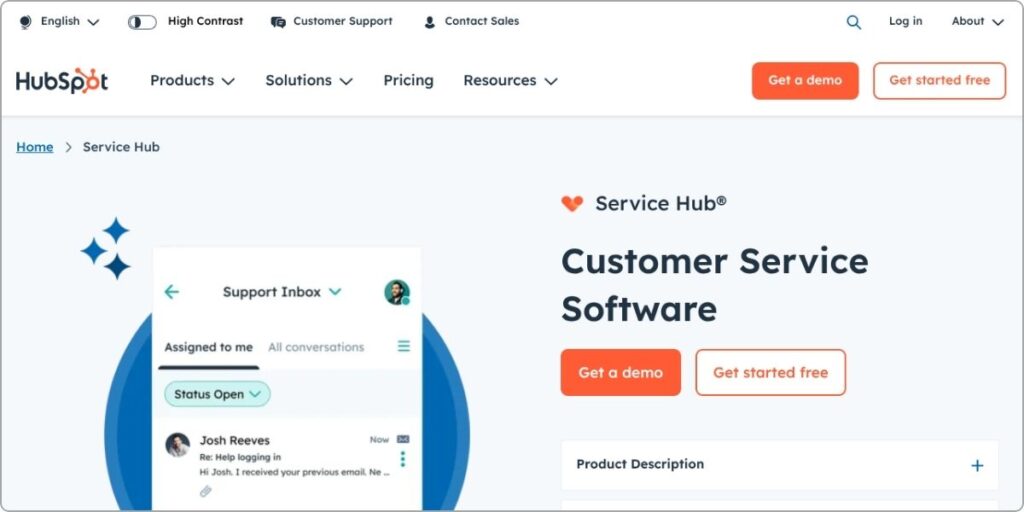
HubSpot CRM is an intuitive customer engagement software for businesses for customer communication and management of the interactions with clients. Messaging is an encompassing set of tools for sales, marketing, and customer support departments that provide synergy. The marketing automation aspects of the software enables the business to make and send custom email messages and to group the clients accordingly.
It is no different in HubSpot where a rich set of sales tools include advanced reporting, or the real-time tracking of deals. Being a free app that allows for so many user interactions, it is especially popular with small businesses and startups.
Key Features:
- Contact management controls and manages user data by providing an organized and hierarchical interface.
- Marketing Automation makes work with email campaigns and the division of customers into certain groups easier.
- Sales pipeline tracking coordinates deal making and records the progress of the deals in every stage.
Pros:
- User-friendly
- Integrates with HubSpot CRM
- Free tier available
Cons:
- Limited advanced features in lower tiers
- Can become expensive as you scale
- Customization limitations
Pricing: Free plan available; paid plans start at $45/month.
Website: HubSpot Service Hub
3. Zendesk
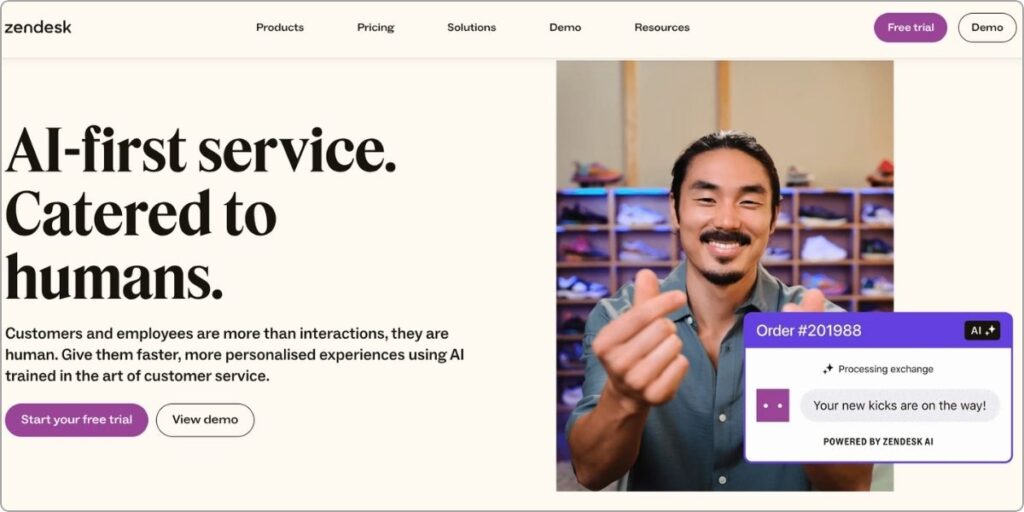
Zendesk is a flexible customer service and communication tool that lets organisations succeed at delivering superior client support. This software has a single interface organised to request originating from multiple contact points so that no customer inquiry remains unaddressed. A major category of Zendesk’s competitive advantage is its set of self-service features based in a well-designed knowledge base and lively forum.
These features help customers know where to look for answers themselves, decreasing loads which support teams deal with. It also integrates artificial intelligence to automate ticketing processing and optimize the machine to solve the tickets.
Key Features:
- Unified dashboard coordinates the inquiries by customers through various platforms.
- Knowledge base develops a range of self-service support opportunities.
- AI and automation reduces the number of tickets it takes to close a ticket through the use of artificial intelligence.
Pros:
- Scalable
- Customizable workflows
- Comprehensive reporting
Cons:
- Pricing can be high for small businesses
- Steep learning curve
- Some features require additional add-ons
Pricing: Starts at $55/user/month.
Website: Zendesk
4. Freshdesk
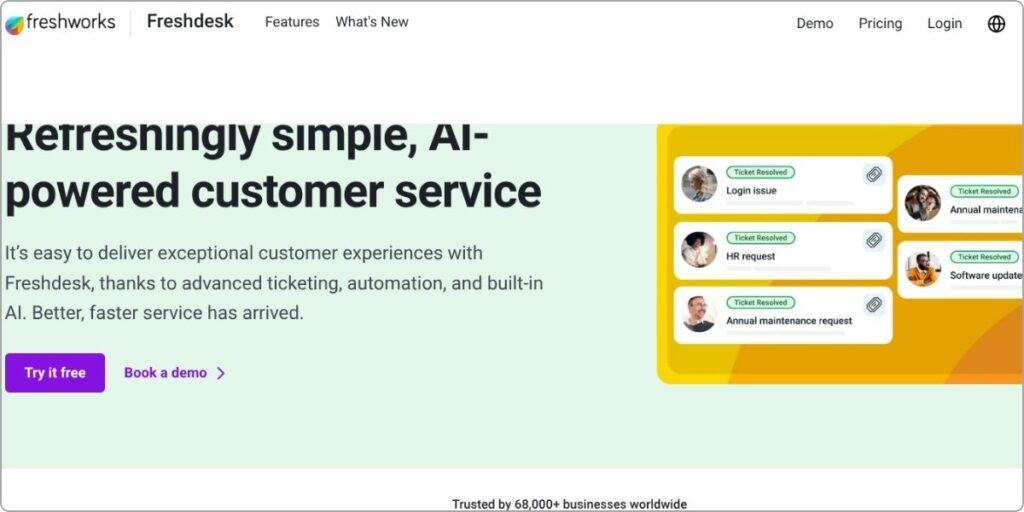
Freshdesk is an online customer engagement software for businesses that is intended for use by small and medium enterprises. It comprises ticketing, chat, as well as auto tools that create a great support system for the agents. It also includes ticketing that enables the businesses to categorise and address customers’ issues more efficiently.
Other features include Artificial Intelligence through integration with Knowledge Base Chatbot that solves customers’ simple issues leaving complicated ones for the support teams. It is therefore well equipped for multi channel communication through Email, Chat, Phone and even Social media.
Key Features:
- Ticketing system arranges and categorizes customer support tickets following their level of importance.
- AI Chatbots have reply commands that give automatic answers to frequently asked questions.
- Multichannel communication encompasses e-mail, phone, Live Chat and social networking.
Pros:
- Affordable
- Easy to set up
- Intuitive interface
Cons:
- Limited advanced features in lower tiers
- Customization constraints
- Occasional performance issues
Pricing: Free plan available; paid plans start at $15/user/month.
Website: Freshdesk
5. Intercom
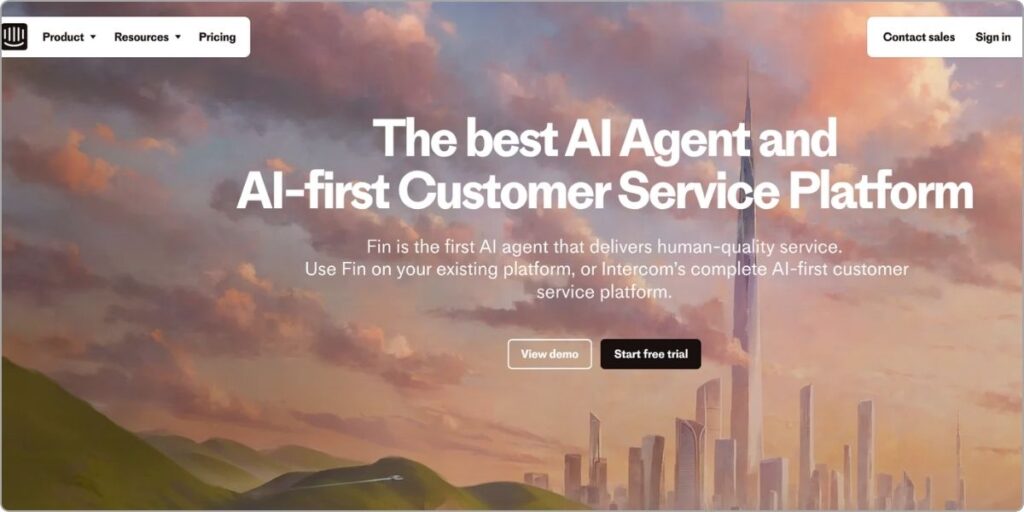
Intercom is a customer engagement software for businesses that allows businesses to engage its customers via meaningful and effective conversations. It is a perfect fit for those companies which are willing to enhance their customer connections via instantly active messaging and campaigns.
The practicality of the customer segmentation permitting companies to filter clients by their actions, age, or choice. Intercom also provides solutions such as product tours to help users learn and engage more with the products. The proactive engagement with the customers allows it to stand out from the rest of the tools.
Key Features:
- Provides unique chats to the visitors.
- Focuses on selected target customers.
- Teaches customers the way to effectively employ your software or services.
Pros:
- Real-time engagement
- Scalable solutions
- Advanced automation
Cons:
- Pricing can be high for small businesses
- Complex setup
- Limited features in lower-tier plans
Pricing: Starts at $39/month.
Website: Intercom
6. Twilio

Twilio is a module that allows companies to connect to their customers in areas such as SMS, voice, video, and chat. The programmable APIs optimized for rich interfaces make it possible to create highly custom tailored communication systems.
The fact that this customer engagement software is designed to be scalable guarantees that businesses can reach customers in different locations of the world. The flexibility of Twilio for use across multiple channels makes it appealing to various businesses attempting to enhance communication with their clients.
Key Features:
- Develops own specific communication interfaces.
- Supports texts, voice, video, and live chat as well.
- Enables interaction at different levels such as cross- regional.
Pros:
- Highly customizable
- Scalable for all business sizes
- Extensive developer support
Cons:
- Complex setup
- High costs for frequent usage
- Requires technical expertise
Pricing: Pay-as-you-go, starting at $0.0075 per SMS.
Website: Twilio
7. Pipedrive
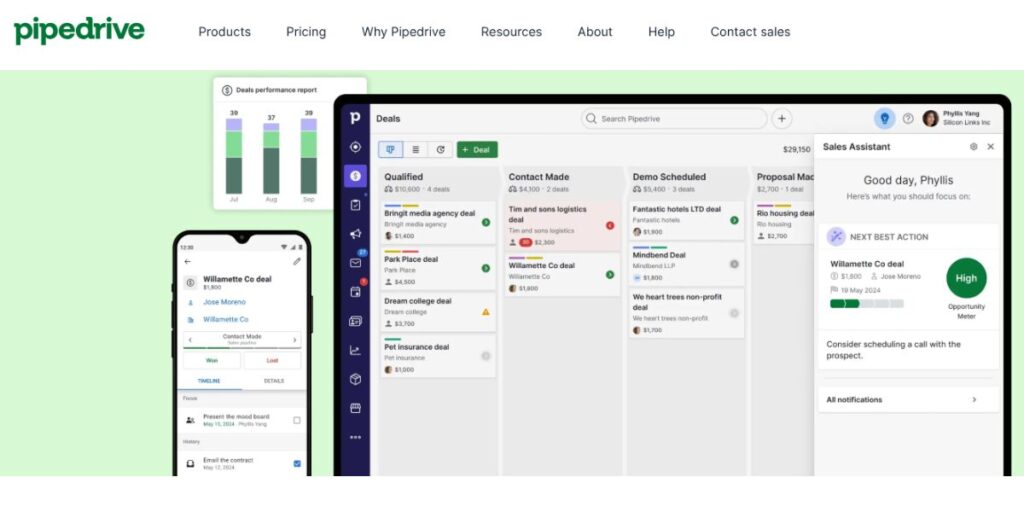
Pipedrive is a CRM and customer engagement software specifically built to assist organizations manage their customer relations better. Due to its features and clearly presented pipeline interface, interaction with customers and dealing with them are very easy.
It also includes new technologies such as an AI sales assistant that helps its users get more out of their customers and sell more effectively. Its flexible sales funnels to fit business needs make the tool more efficient and productive to be used in today’s business operations.
Key Features:
- Fits into your sales and engagement requirements nicely.
- Gives an understanding of what tactics will be more effective when selling the product.
- Activity management as it does calls, emails and tasks tracking
Pros:
- Easy to use
- Mobile-friendly
- Affordable for small businesses
Cons:
- Limited advanced analytics
- No free plan
- Basic features in entry-level plans
Pricing: Starts at $14.90/user/month.
Website: Pipedrive
8. Zoho Desk
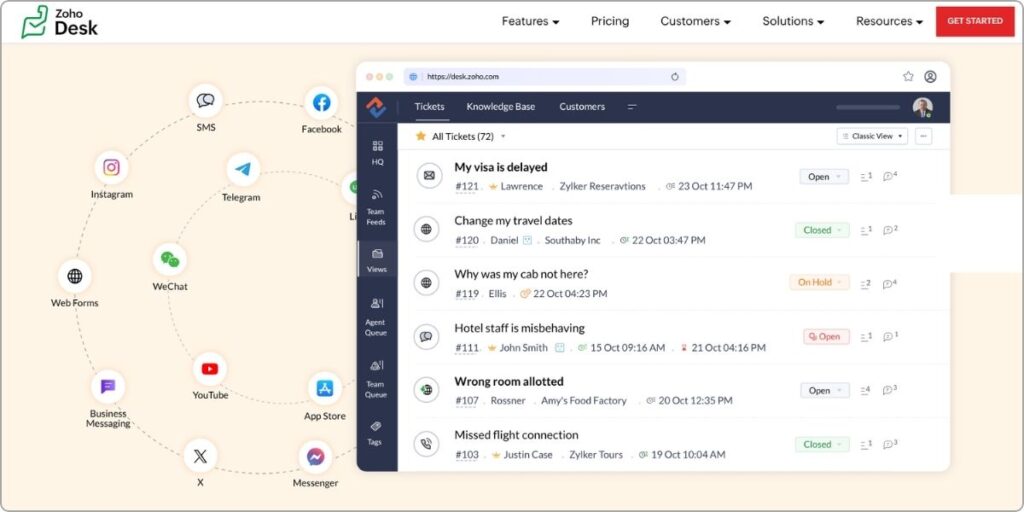
Zoho Desk is a flexible customer engagement software for businesses that makes it easier for a business to handle customer services in various touch points. Features such as Zia are digitised assistants which revolutionise operational simplicity and provide data analysis on customers’ behavior.
The ideal integration transmits all customer information from the channels such as email, chat, phone and social media to a single dashboard so that support teams can answer them promptly. Zoho Desk has also got a knowledge base section where customers can seek a solution to a problem on their own.
Key Features:
- It also provides support services such as automation of ticket resolution and offering analysis.
- Co-ordinates the company’s interface with the customer.
- Equips customers with Frequently asked questions and information.
Pros:
- Affordable pricing
- Integrates with Zoho ecosystem
- Scalable for growing businesses
Cons:
- Limited customization
- Learning curve for advanced features
- Basic reporting tools
Pricing: Free plan available; paid plans start at $14/user/month.
Website: Zoho Desk
9. Drift

Drift is a conversational customer engagement software for businesses that deals with the direct interaction of the marketer with the customer. It employs conversational AI to power chat, sorting out leads and then forwarding them to an appropriate agent.
The live chats make it possible to respond to customers immediately, producing a better customer experience. It also is also good at lead capture, mainly the ability to filter and prioritize genuine leads that could benefit the business. Hence the software is highly flexible especially due to its compatibility with CRM and marketing systems.
Key Features:
- Automates real-time chats.
- It offers immediate customer service at the point of sale.
- Helps filter potential buyers automatically.
Pros:
- Seamless customer engagement
- Intuitive user interface
- Customizable chat bot flows
Cons:
- High pricing for advanced features
- Limited CRM integrations
- Complex setup for new users
Pricing: Starts at $40/month.
Website: Drift
10. Kustomer
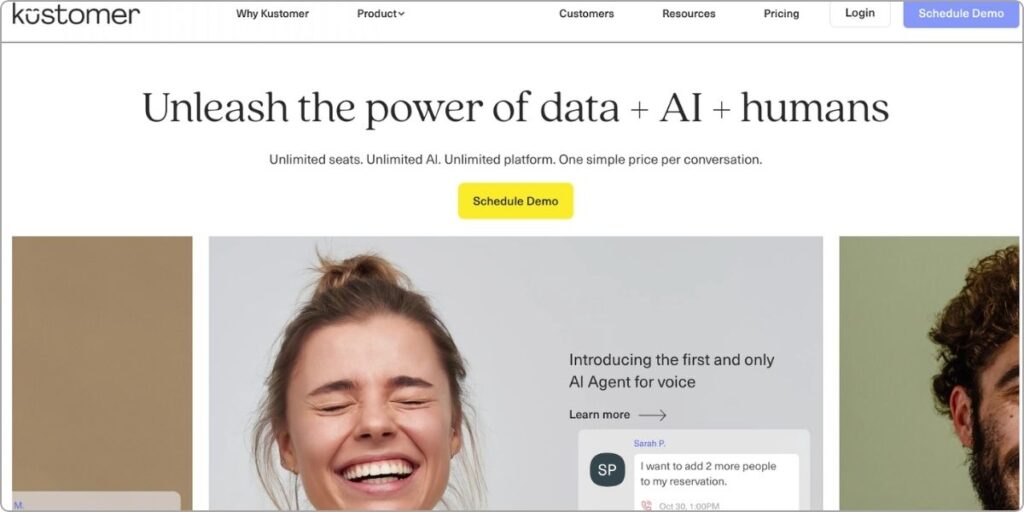
Kustomer is an AI-powered customer engagement software for businesses that looks to manage all customer interactions within a timeline. This approach enables businesses to appreciate the chronology of a specific customer and attach the necessary support.
It is also designed as an omnichannel communication tool which means that it provides various contact methods such as email, instant message, social nets, or phone call. It has its automation tools that help in the repetitive work freeing the support groups for hard problems. Kustomer also provides high-performing data analysis for overall performance .
Key Features:
- Can provide end to end real time record of all customer transactions.
- Integrates features of sending emails, using chat, sharing in social networks, and making phone calls.
- Streamlines repetitive tasks.
Pros:
- Advanced reporting tools
- AI-powered automation
- Easy integration with other tools
Cons:
- Expensive for small businesses
- Limited customization options
- Steep learning curve for beginners
Pricing: Starts at $89/user/month.
Website: Kustomer
11. ActiveCampaign
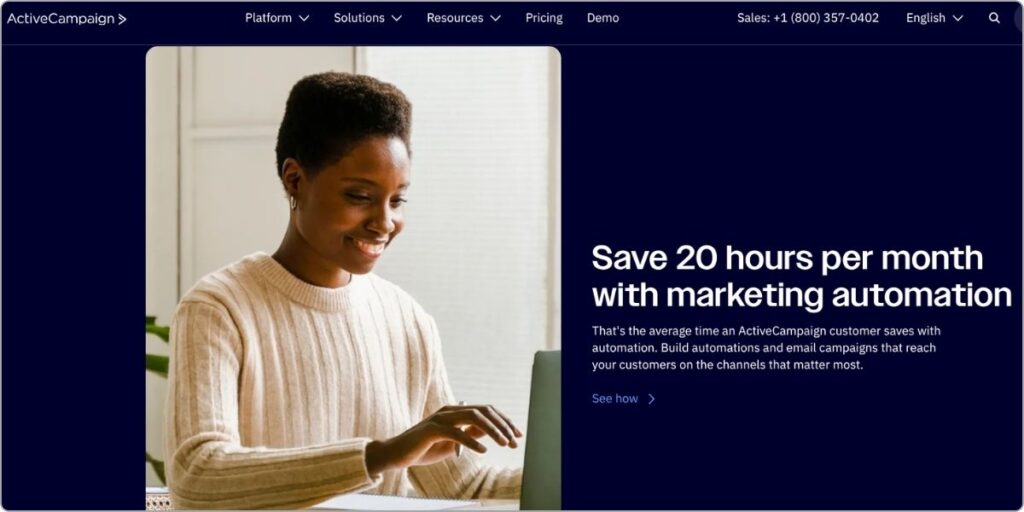
ActiveCampaign is a versatile and strong customer engagement software for businesses that unites the functionality of an e-mail marketing, automation, and CRM tools. It assists companies approach consumers by customization and improve targeting by segmenting clients.
A unique feature of this platform is the ability to schedule email sending in order to reach out at the best time possible. ActiveCampaign provides the businesses with a fully-functional customer relationship management tool system that helps to monitor customer relations as well as sales funnels. They also support more popular online shopping carts such as Shopify and WooCommerce.
Key Features:
- Email marketing personalizes current emails and initiates email marketing campaigns.
- CRM integration records customer contacts and sales.
- Predictive improves the timing of sent emails based on the amount of engagement received.
Pros:
- Easy integration with platforms like Shopify and WooCommerce.
- Highly customizable automation workflows.
- Excellent customer support.
Cons:
- Steeper learning curve for beginners.
- Limited design flexibility in email templates.
- Advanced features can become expensive.
Price: Starting at $29/month (Lite Plan).
Website: ActiveCampaign
12. Sprinklr
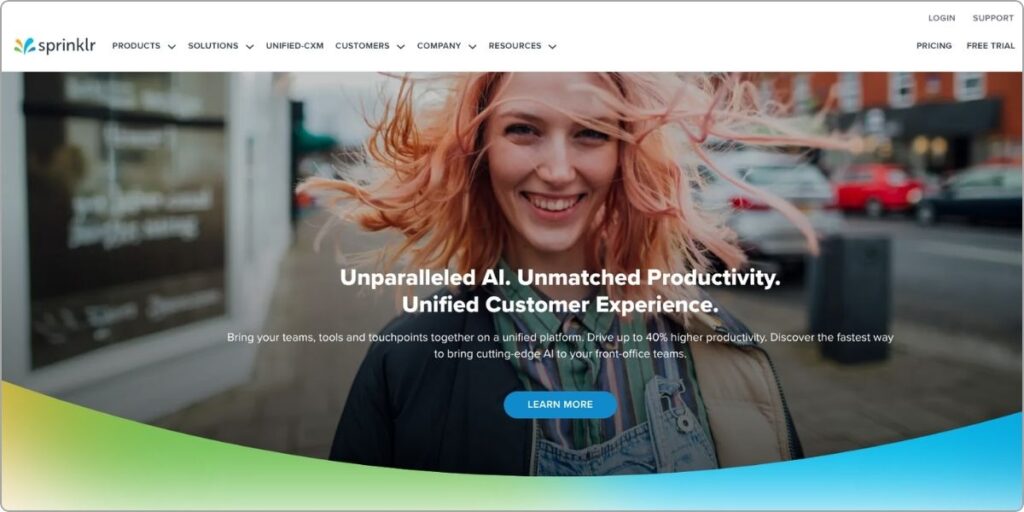
Sprinklr forms a coherent and ubiquitously used enterprise suite primarily for social media engagement and customer experience management. It enables business organisations to track, analyse and respond to customer interactions within different social platforms.
It can be stated that the customer engagement software which is delivered as an artificially intelligent one assists the companies in comprehending the sentiments reflected in the materials produced. Campaign management tools on Sprinklr make it easier to execute social media marketing campaigns, keeping them both coordinated and productive.
Key Features:
- Social listening continuously tracks the number and tone of customers on social media.
- AI-Driven insights offers analysis that points out the next best course of action.
- Campaign management saves time to be utilised in the execution of technological solutions in social media marketing campaigns.
Pros:
- Seamless tracking across multiple social platforms.
- Scalable solution for enterprise-level businesses.
- Advanced analytics for sentiment and trend analysis.
Cons:
- Complex interfaces may require training.
- High pricing for small businesses.
- Limited functionality for non-social media channels.
Price: Custom pricing based on business needs.
Website: Sprinklr
13. Klaviyo

Klaviyo is a marketing automation customer engagement software for businesses, specifically for e-commerce businesses primarily focused on email and SMS campaigns. It assists the companies in developing a campaign that appeals to the intended consumer.
The tools for analytics on the platform help businesses predict the behavior of clients and adapt to it. Being a marketing focused platform, Klaviyo works best with major eCommerce platforms to make it a suitable solution for the said sector.
Key Features:
- Email and SMS automation sets up single and unique customer experiences.
- Predictive analytics are usable to determine future behavior of customers.
- E-Commerce Integrated perfectly with solutions such as Shopify.
Pros:
- Excellent for eCommerce-specific campaigns.
- Deep customer behavior insights.
- Easy-to-use interface for campaign management.
Cons:
- Pricing increases with contact volume.
- Limited support for non-eCommerce businesses.
- SMS marketing features available only in certain regions.
Price: Free plan available (up to 250 email contacts); Paid plans start at $20/month.
Website: Klaviyo
14. Mailchimp

Mailchimp is an email marketing customer engagement software for businesses that also includes tools for customer relations and the audience. It has a simple layout and available templates benefit establishments of different sizes.
It includes analytics tools that relay information on the effectiveness of a particular campaign, and this helps businesses to do better. Customer segmentation tools available at Mailchimp can be used to promote relevant content in order to reach the right market.
Key Features:
- Email marketing describes a concept as well as implementing specific email marketing campaigns.
- Analytics dashboard provides live monitoring of campaigns.
- Customer segmentation enables targeted marketing.
Pros:
- Beginner-friendly with free plan availability.
- Wide variety of integrations and add-ons.
- Detailed reporting and analytics tools.
Cons:
- Limited customization for advanced users.
- Pricing scales quickly with list size.
- Automation tools are less robust compared to competitors.
Price: Free plan available; Paid plans start at $13/month.
Website: Mailchimp
15. Tidio
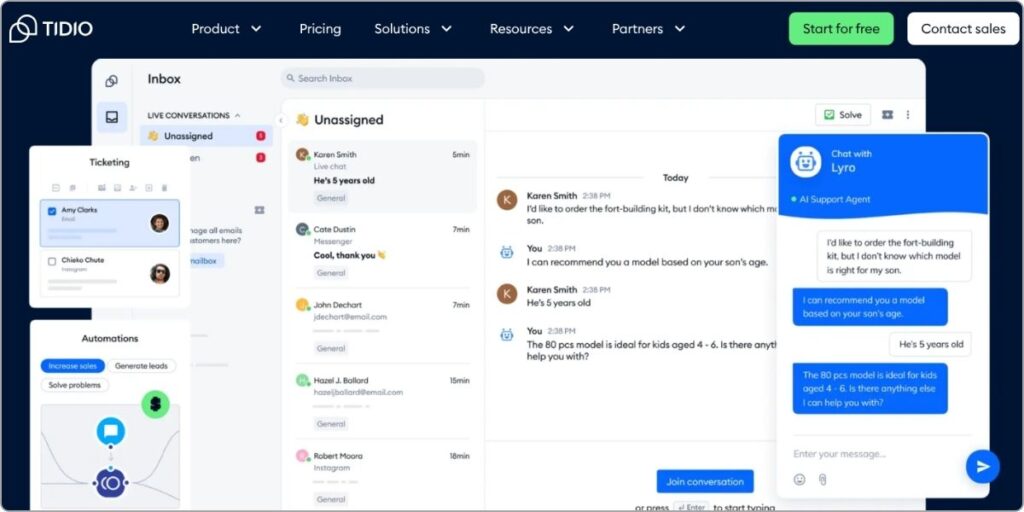
Tidio is a modern, lightweight, and multi-functional live chat with chatbots and an email marketing solution. Small and medium-scale industries can find it rather useful as it is inexpensive and covered with a simple, user-friendly interface to improve the customer services.
Because this software avails chatbot and self-service, it also makes it possible for businesses to attend to the customers 24/7. For the purpose of interacting with customers on the move, there is also an opportunity to download the application of Tidio and manage customer communication on the go.
Key Features:
- Enables the sales team to interact with customers in real time.
- Chatbot automation answers simple inquiries 24/7.
- Email integration handels customer communication through email and chat in one single interface.
Pros:
- Affordable pricing plans
- User-friendly interface
- Mobile app accessibility
Cons:
- Limited advanced features
- Basic analytics
- Chatbot functionality restricted in free version
Pricing: Free plan available; paid plans start at $18/month.
Website: Tidio
16. SendPulse
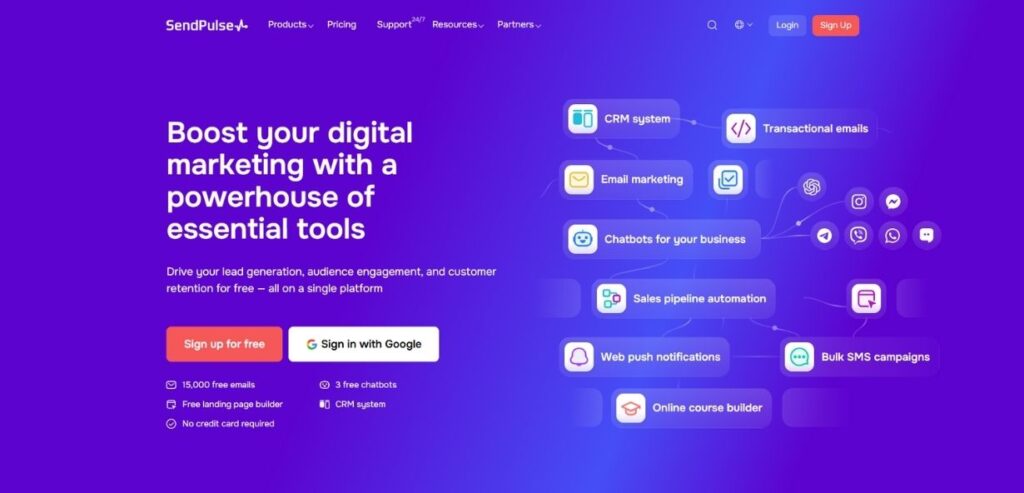
SendPulse focuses on multi-channel customer engagement through automation and personalization. It effectively engages customers, improves retention, and boosts conversions all thanks to a plethora of features and communication channels available on the platform.
The most prominent feature that SendPulse has to offer is a comprehensive chatbot builder that allows businesses to create chatbots for WhatsApp, Instagram, Facebook, Telegram, and Viber. Users can choose to integrate their chatbot with ChatGPT or connect a payment system to receive secure payments from customers.
Key Features:
- Multichannel chatbot builder for popular messengers and social media platforms
- CRM with email marketing and transactional SMS messages
- Landing page builder with a gallery of pre-designed templates
Pros:
- All-in-one marketing automation platform
- Free plan for small businesses
- Mobile App for chatbot management on the go
Cons:
- Free plan with limited functionality
- Open AI integration is paid separately
Pricing: Free plan with 3 chatbots, 1 landing page, and 15,000 emails. Paid plans start at $8 per month.
Website: https://sendpulse.com/marketing-platform
How to Choose the Best Customer Engagement Software
- Business Needs Alignment: Determine how effective or inefficient the software is in meeting its objectives as it retains customers or generates leads.
- Scalability: Make sure that these software selected for the business can be scale-up in future to avoid seeing your business facing a lot of restrictions in the future.
- Ease of Use: User interfaces must be more or less intuitive and the implementation processes less complex.
- Customization Options: Target those products that have specific packages for the particular fields of business.
- Integration Support: Check connectivity with your current tools and equipment.
- Cost-Effectiveness: The pricing strategy should be compared for its functionality and appropriate prices should be set taking into consideration the overall ROI in the future.
Conclusion
Customer engagement software is now an indispensable tool by which companies seek to maintain sustainable relationships with their customers. When implemented, these solutions will help organisations improve interaction, tailor messaging and gain intelligence to improve customers’ experience and, thus, their loyalty. The right software also shows operational efficiency and has explosive sales by increasing trust and becoming a brand’s face
.Choosing the correct engagement software calls for the assessment of your business needs, evaluation of the key features and consideration of scalability and integration options. When there are so many possibilities, the decision is wise to guarantee that the clients will receive the best experience and you will remain relevant in the relevant market.
FAQs
1. What is customer engagement solutions?
Customer engagement tools for businesses enables organizations to communicate with customers to build and strengthen the bond with them.
2. Why is customer engagement important?
It enhances customer loyalty as well as clarifies brand identity and thus is a major factor in revenue promotion.
3. What are some of the things that should be noted in Customer engagement platforms?
Multichannel support, self-service, pure communication, collaboration, insights, interfacing, and elastic.
4. In which industries is customer engagement software of most value?
This affects retailing, e-commerce, healthcare, the financial sector and customer service.
5. What are the approximate expenses of the AI-driven engagement software?
Some cost nothing for the basic features, others are in the range of $100-300 monthly if you need enterprise-level features.

